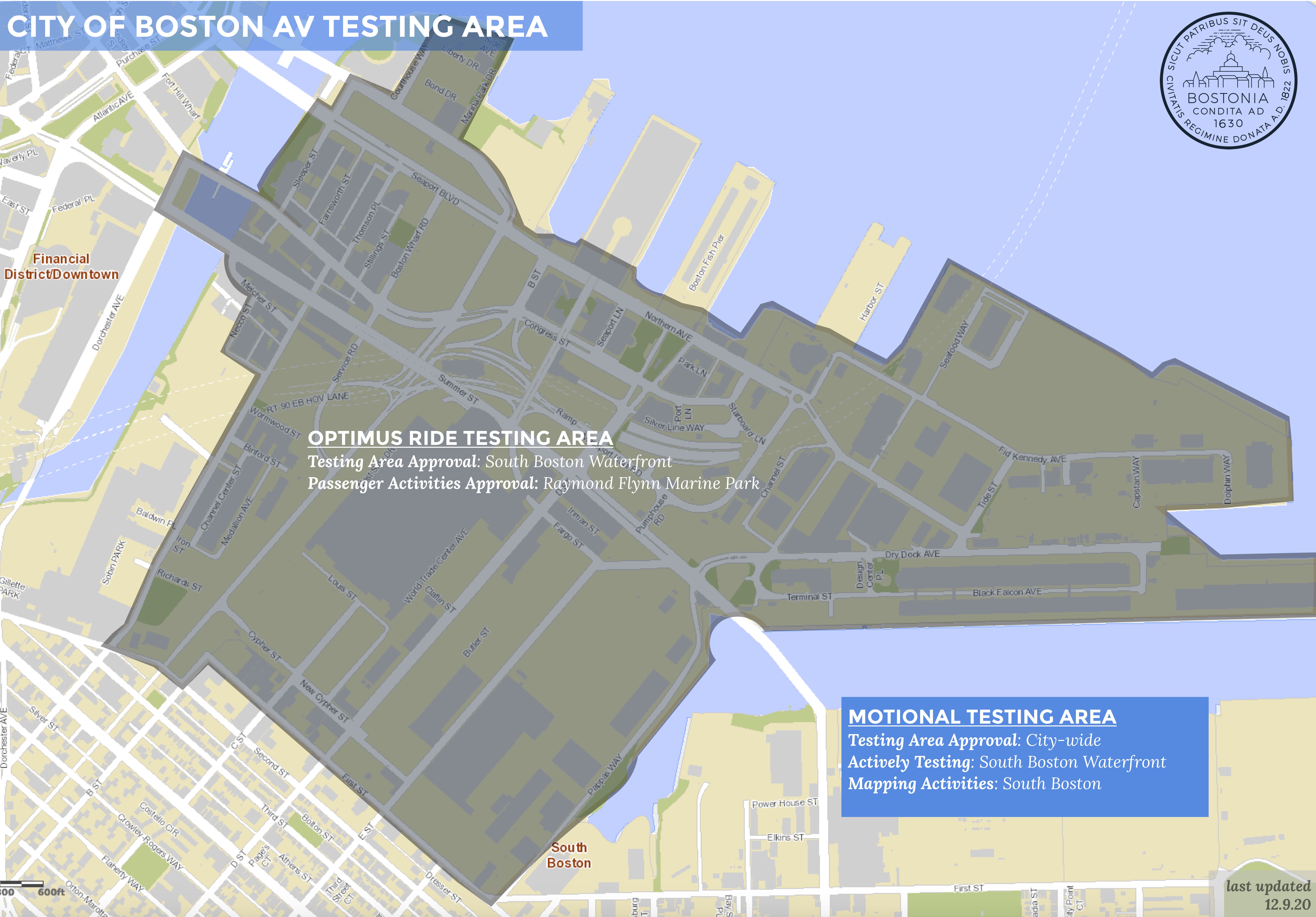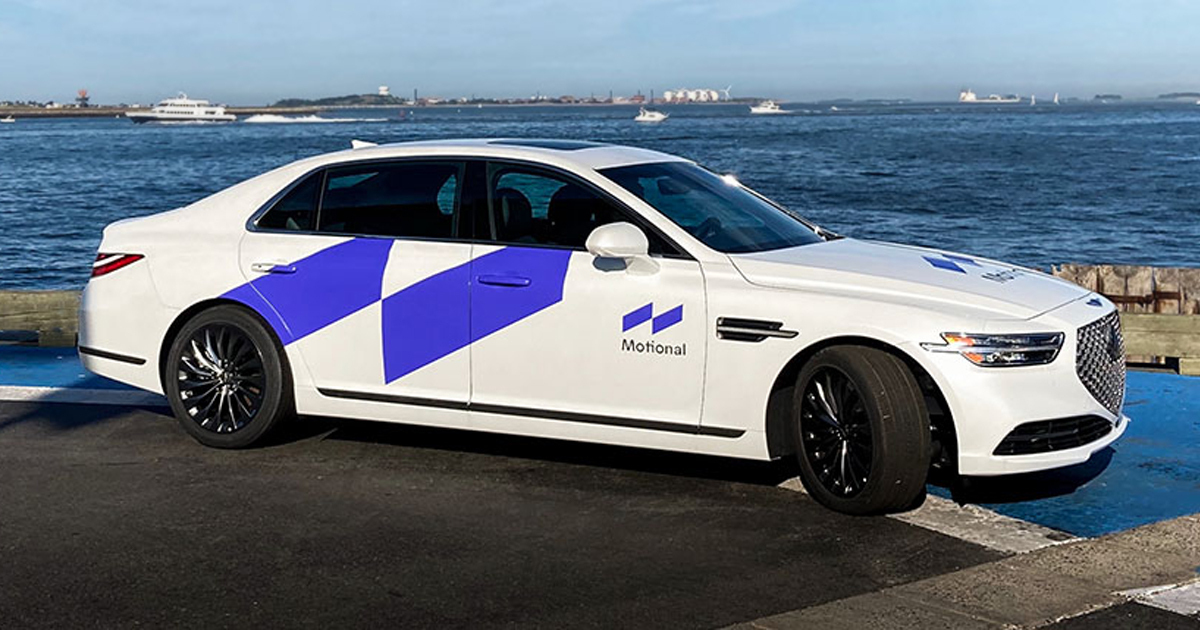Autonomous vehicles: Boston’s approach
Learn more about our plans for testing autonomous vehicles, and their potential future in the City of Boston.
Zero deaths. Zero Injuries. Zero disparities. Zero emissions. Zero Stress. This is Boston's vision for our transportation future.
Autonomous vehicles offer immense promise to help us get closer to these goals. However, the promise of these vehicles isn't a given. They could displace an important workforce and encourage both sprawl and congestion. That’s why we launched an autonomous vehicle testing program.
We want to shape the development of technology and policy to deliver on the potential promise — and not the potential drawbacks.
What can be achieved?
During our Go Boston 2030 planning, these were the values Boston residents told us they wanted for their transportation system to embody.
Who stands to benefit most from this technology if it’s applied the right way? Many people, including:
- the aging population and those with visual impairments
- those looking to reduce the burden of personal vehicle ownership, and
- those without access to rapid transit.
We can reduce the number of vehicles on our roadways through the adoption of shared fleets of autonomous vehicles. This frees up space for other uses, other travel modes, and creates more predictable travel times.
Self-driving vehicle testing
We are taking a graduated approach to AV testing in Boston.
At first, any company will be constrained in the time, place, and manner of their testing. Before testing on streets, companies must meet — off-street — our important standards, including:
- ease of manual takeover from autonomous mode
- emergency braking and emergency stop functionality, and
- basic driving capabilities, such as staying within a lane.
We’ll only allow testing during good weather and daylight hours in early phases. Once a company reaches certain milestones, we will allow them to begin testing::
- in other areas of Boston
- at night-time, and
- during inclement weather.
Currently, vehicle testing in Boston includes the use of a safety driver focused on roadway activity. There is also a safety engineer monitoring the vehicle's software.
Initial on-street testing occurs within the City's Raymond Flynn Marine Park in the Innovation District. After meeting test plan milestones, partners can request to expand out of the Marine Park in subsequent phases.
The majority of testing is currently occurring in the South Boston Waterfront. Motional (formerly Aptiv and nuTonomy) has approval for mapping additional neighborhoods in the City. In Fall 2021, Motional began user interface and experience testing, where the vehicle is piloted by a human driver at all times, in other neighborhoods, including: Downtown, North End, Seaport, Fort Point, Roxbury, Dorchester, South Boston, Back Bay, South End, Chinatown, Mission Hill, and Longwood/Fenway neighborhoods. There is not currently autonomous testing in these areas.
Vehicle Testing: Safety Protocols
We believe that safety is paramount in the testing of autonomous vehicles.
The City of Boston and our partners at MassDOT have put together a number of safety checks in the application process and within the administration of the phased testing program.
- a history of their testing practices
- documentation of extensive off-street and previous on-street testing
- compliance with federal safety guidelines for autonomous vehicles, and
- details of safety driver training procedures.
Our testing partners are collaborative in this effort and often exceed the safety standards put in place.
Current testing partners
The City approved Motional (formerly nuTonomy & Aptiv) for on-street testing in December 2016. This was expanded to citywide testing in June 2018. Motional is currently testing in the South Boston Waterfront and mapping portions of South Boston in addition to off-street testing. Motional has approval for testing through January 2024.
Review the related documents section below for more testing details.
Future partners
The City is interested in exploring partnerships and shared research agendas in four areas:
- vehicle technology testing focused on Boston’s unique environment
- business model exploration that speaks to the goals of Go Boston 2030, and
- experiments with connected transportation infrastructure
- research and engagement with the public on autonomous mobility and workforce implications.
Please connect with us if you would like to explore the future together.
To begin testing in the City of Boston, a provider must:
- Reach out to the City via the email provided on this page to make us aware of your intent
- Prepare a testing plan
- complete an application with the Massachusetts Department of Transportation
- Complete a memorandum of agreement with the appropriate parties (including the City of Boston if you plan to test within City limits)
In advance of the application to MassDOT, a testing provider needs to agree on a phased testing plan with the City of Boston.
Building Blocks of AV Testing: MOAs, test plans, and testing reports
Documents- Motional: 2022 MOA to Test ADS on Public Ways
- Motional (formerly nuTonomy): Testing plan
- Motional (formerly nuTonomy): Passenger Pilot Test
- Motional (formerly nuTonomy): 2017 Q1 Report
- Motional (formerly nuTonomy): 2017 Q2 Report
- Motional (formerly nuTonomy): 2017 Q3 Report
- Motional (formerly nuTonomy): 2017 Q4 Report
- Motional (formerly nuTonomy): 2018 Q1 Report
- Motional (formerly nuTonomy): 2018 Q2 Report
- Motional (formerly nuTonomy): 2018 Q3 Report
- Motional (formerly nuTonomy): 2018 Q4 Report
- Motional (formerly nuTonomy): 2019 Q1 Report
- Motional (formerly nuTonomy): 2019 Q2 Report
- Motional (formerly nuTonomy): 2019 Q3 Report
- Motional (formerly nuTonomy) Phase C request
- Motional (formerly nuTonomy) Phase C approval letter
- Motional (formerly nuTonomy) Phase D (citywide) test plan update
- Motional (formerly nuTonomy & Aptiv): 2019 Q4 Report
- Motional (formerly Hyundai-Aptiv): 2020 Q1 Report
- Motional (formerly Hyundai-Aptiv): 2020 Q2 Report
- Motional: 2020 Q3 Report
- Motional: 2020 Q4 Report
- Motional: 2021 Q1 Report
- Motional: 2021 Q2 Report
- Motional: 2021 Q3 Report
- Motional: 2021 Q4 Report
- Motional: 2022 Semi-Annual Report - June
- Motional: 2022 Semi-Annual Report - December
- Optimus Ride: 2019 Q1 Report
- Optimus Ride: 2019 Q2 Report
- Optimus Ride: 2019 Q3 Report
- Optimus Ride: 2019 Q4 Report
- Optimus Ride: 2020 Q1 Report
- Optimus Ride: 2020 Q2 Report
- Optimus Ride: 2020 Q3 Report
- Optimus Ride: 2020-2021 Q4-Q2 Report
- Optimus Ride: 2021 Q3 Report
- Optimus Ride Passenger Pilot Test Plan
City of Boston's thought partners
We’ll be working closely with the Commonwealth of Massachusetts, MassPort, and area research institutions. However, we’ve also created two formal partnerships to help us think about what autonomous vehicles could mean for cities:
In June 2016, Boston was selected by the World Economic Forum as a focus-city for policy and pilot development of autonomous vehicles. Through this partnership, we worked with:
- the World Economic Forum (WEF)
- Boston Consulting Group (BCG)
- international cities, and
- mobility industry leaders.
Through that work with the WEF and BCG we produced two reports. Reshaping Urban Mobility with Autonomous Vehicles and Making Autonomous Vehicles a Reality and completed an agent-based model of Boston to reflect a shared autonomous future.
Transportation For America’s Smart City Collaborative share ideas, data, and best practices with 14 other cities across the country. Our specific area in this collaborative is the autonomous vehicle working group.
VOLPE NATIONAL TRANSPORTATION SYSTEMS CENTERThe City of Boston is part of the Low-speed Automated Shuttle Working Group. This collection of public officials around the country leads shuttle testing work. The working group is chaired and facilitated by the the team at Volpe. The goal is to share learnings and best practices.
Videos
Autonomous Vehicles: Driving the City of the future
Why do we need new kinds of mobility in the City of the Future?
Boston Consulting Group AV Model
A traffic simulation for part of Downtown Boston assessing the impact.
Making autonomous vehicles a reality
Highlights from the different autonomous vehicle pilots in Boston.
Quantifying the impact
Taking a look at the effect of autonomous vehicles on Boston traffic.




